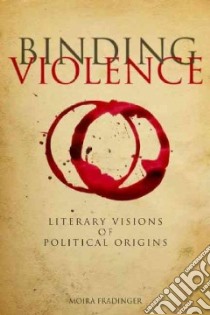Binding Violence - 9780804763301
Un libro in lingua di Moira Fradinger edito da Stanford Univ Pr, 2010
- € 63.40
- Il prezzo è variabile in funzione del cambio della valuta d’origine
"What I find most striking in this work is its originality: Fradinger shows how three very different authors writing in very different genres from three very different ages all raise the same question. Her project is brilliantly pursued in a clear and sophisticated manner."---Marcel Henaff, University of California, San Diego
"Binding Violence is a tour de force of humanistic erudition as well as one of the best interdisciplinary essays that I have read. Fradinger shows how the literary imagination is able to register the violent undercurrents that are unleashed when Western democracy becomes the sovereign paradigm."---Cesar A. Salgado, University of Texas at Austin
"As communities are inevitably constituted, membership in the political sphere relentlessly demands a concomitant act of violent exclusion. With this as its premise, Binding Violence offers astonishing new readings of Sophocles' Antigone and key works of Sade, as well as transforming our understanding of the nature of power in Vargas Llosa's dictator novel. Moira Fradinger thus brings together fiercely intelligent readings and reflections about literary texts, political theory, history, and the contemporary political scene."---Carol Jacobs, Yale University
Binding Violence assumes that literature has things to say about questions that may be obscured by fields of inquiry not normally considered to be in its purview. It exposes the relation between literary imagination, autonomous politics, and violence through the close analysis of literary texts that speak to a blind spot in democratic theory, namely, how we decide democratically on the borders of our political communities. Fradinger mines three works in particular---Sophocles' Antigone. D. A. F. de Sade's 120 Days of Sodom, and Vargas Llosa's The Feast of the Goat---for evidence of the democratic imagination of the eras that produced them, ancient Greece, the French Revolution, and our present, the democratic "third wave." These works bear the imprint of the anxieties of democracy concerning its other---violence---especially when the question of a re-definition of membership is at stake. The book shares the philosophical interest in rethinking politics that has recently surfaced at the crossroads of literary criticism, philosophy, critical theory, and psychoanalysis. Fradinger's aim is to take seriously the responsibility to think through and give names to the political uses of violence and to find ways in which literature and literary criticism can provoke useful reflection on the problem of violence as it relates to politics and on literature as it relates to its times.
Informazioni bibliografiche
- Titolo del Libro in lingua: Binding Violence
- Sottotitolo: Literary Visions of Political Origins
- Lingua: English
- Autore: Moira Fradinger
- Editore: Stanford Univ Pr
- Collana: (Hardcover)
- Data di Pubblicazione: 25 Gennaio '10
- Genere: LITERARY CRITICISM
- Argomenti : Violence in literature Politics in literature Politics and literature
- Pagine: 333
- ISBN-10: 0804763305
- EAN-13: 9780804763301


